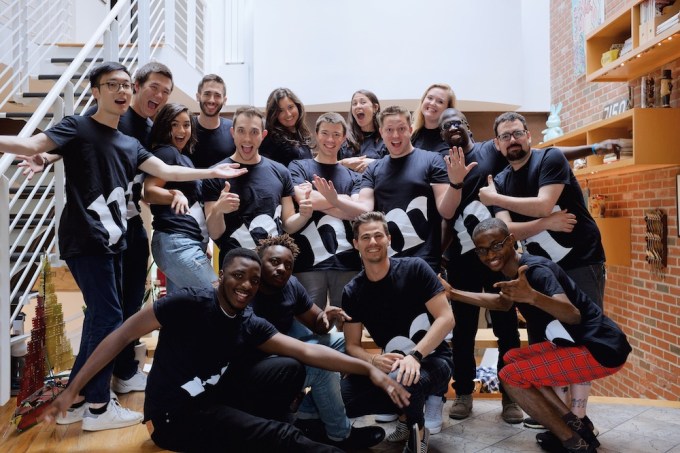Startups
Meet the 20 startups in this year’s GCT Startup-in-Residence program

At the end of last year, Grand Central Tech announced plans to work with the Milstein real estate family to transform a midtown Manhttan high-rise into a tech hub called Company. And startups remain an important part of the mix — in fact, Company is unveiling a list of 20 startups participating in this year’s GCT Startup-in-Residence program.
What does Startup-in-Residence mean? Well, Company CEO Matthew Harrigan said the program will continue to offer what it’s always offered — desk space, as well as access to events and amenities, for a select group of early-stage entrepreneurs. And participants don’t have to give up equity or pay rent.
The deal might seem too good to be true, but Harrigan argued that the startups make Company more appealing to its enterprise tenants: “We are retrofitting this building to look and feel and operate like a brand new building … but the one amenity that cannot be simply rolled out is people.”
He also said the program is only taking up 15,000 square feet of the building’s 150,000 square foot total.
“It sounds like an exceptionally generous offering and it isn’t,” he said. “It sounds like it doesn’t make a ton of business sense but that’s actually wrong … Fifteen thousand square feet of space to great early-stage founders helps establish a truly remarkable program and campus in New York City. Those are resources are well spent.”
In the past, we’ve written about Grand Central Tech as an accelerator program, but Harrigan said, “We weren’t and aren’t an accelerator” — it just used “the nomenclature that’s known.” Now the program is taking on a more fitting name, though it sounds like the operations won’t be changing too dramatically.
“We typically have very sophisticated founding teams, giving them an ideal environment in which to work,” Harrigan said. “By and large, our companies are left to their own devices — we don’t presume to create a curriculum or some series of programming. It’s a somewhat passive approach, but we make sure all people in the community are linked up with each other.”
Also worth noting: This year’s class consists of 40 percent women founders and CEOs, and it covers industries like energy, mental health, e-commerce, biotech, adtech and food.
Here’s a list of the companies, with descriptions provided by Company (and edited by me for clarity and length). We’ve also written about a number of them before, so I’m including links to past coverage when possible.

-
- Octave is a full-stack mental health provider, purpose-built to capitalize on evolving consumer habits and a new wave of interest in the space.
- Vowel is a multi-user enterprise voice platform operating in stealth. The company enables businesses to analyze, manage and drive actionable insights from audio data generated in the workplace/meetings.
- Nara Organics is a natural baby food company that is manufacturing the first biodynamic infant formula in the US.
- Twine Labs is a workforce analytics platform that’s creating a single source of truth on employee data across various disaggregated internal corporate databases. Data is then benchmarked against industry standards to help Chief People Officers gain vital, previously unavailable perspective.
- Taskade is a new workplace collaboration platform that enables more efficient team management and product workflows.
- Oova is a biomedical technology company for women’s health that uses smart connected devices to actively monitor hormone levels and help manage women’s fertility health. The company is a spinout of Mt. Sinai.
- Summer is a next-generation student loan management and repayment platform providing users with a comprehensive view of their debt and targeted recommendations on how to alleviate it which evolve based on their current life circumstances.
- Chartable is creating a new enterprise adtech and analytics platform for audio. It’s aiming to do something similar to what DoubleClick, AppAnnie, Flurry and others did when apps were first introduced.
- Particle Health is creating a new medical record data company, leveraging blockchain technology to enable a single health record tying together previously disparate information from a patient’s various doctors, and yielding valuable data insights in the process.
- Project OTC is a holistic new consumer brand targeting outdated over-the-counter brands and products such as antacids, Vitamin-C/immunity support and headache relief. The company is operating in stealth.

-

 Entertainment6 days ago
Entertainment6 days agoIf TikTok is banned in the U.S., this is what it will look like for everyone else
-

 Entertainment6 days ago
Entertainment6 days ago‘Night Call’ review: A bad day on the job makes for a superb action movie
-

 Entertainment6 days ago
Entertainment6 days agoHow ‘Grand Theft Hamlet’ evolved from lockdown escape to Shakespearean success
-

 Entertainment7 days ago
Entertainment7 days ago‘September 5’ review: a blinkered, noncommittal thriller about an Olympic hostage crisis
-

 Entertainment7 days ago
Entertainment7 days ago‘Back in Action’ review: Cameron Diaz and Jamie Foxx team up for Gen X action-comedy
-

 Entertainment7 days ago
Entertainment7 days ago‘One of Them Days’ review: Keke Palmer and SZA are friendship goals
-

 Entertainment3 days ago
Entertainment3 days ago‘The Brutalist’ AI backlash, explained
-

 Entertainment3 days ago
Entertainment3 days agoOnePlus 13 review: A great option if you’re sick of the usual flagships
















